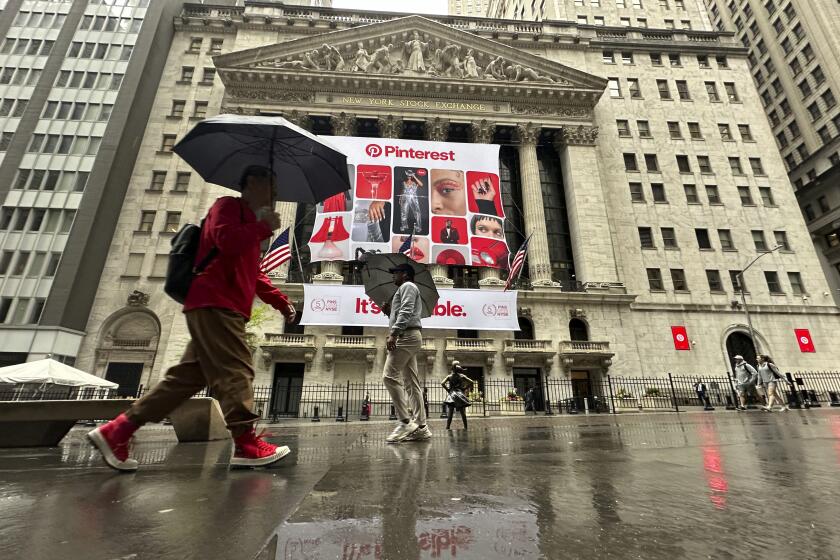Insiders’ Pace of Stock Sales Causing Some Worry
Corporate insiders have been unloading shares at a fast clip this summer, raising concerns among some analysts about the outlook for the stock market and the economy.
Last month, officers, directors and big individual shareholders of U.S. firms sold more than $32 of company stock for every $1 they bought on the open market -- making July the heaviest selling month in more than two years, data tracker Thomson Financial said Tuesday.
The early trend for August is negative as well, with insider sales outstripping purchases by about 22 to 1 this month, based on the dollar value of the shares bought and sold.
Stock transactions by insiders are closely watched because they are expected to have the best sense of how their companies are faring, and whether their shares are potentially undervalued or overvalued in the marketplace.
This summer, “insiders are having their own recall election,” said Michael Painchaud, research director at Market Profile Theorems, a Seattle-based investment advisory firm. “They are recalling some of their profits” by cashing in stock.
What’s especially notable is that the insider sell-to-buy ratio has topped 20 to 1 for three months running, the longest such streak since July-September 2000.
The sales have come in the wake of the stock market’s big spring rally -- Wall Street’s first extended upward move since the end of 2001. The Standard & Poor’s 500 index has risen 24% since mid-March. The Nasdaq composite index has surged 33% in the same period.
By contrast, insiders were selling relatively few shares in February and March, when stocks were near five-year lows.
Among California companies, eight insiders at Sunnyvale-based software maker Mercury Interactive Corp. sold a total of 498,000 shares during mid-to-late July at $40.58 to $42.10 each, Thomson data show. The sellers were Chief Executive Amnon Landan, three other officers, three directors and the general counsel.
At Santa Barbara surgical device maker Inamed Corp., four insiders, including CEO Nicholas Teti and a major shareholder, sold a total of 197,000 shares from Aug. 1 through Thursday at $62.12 to $64.73.
A Mercury spokeswoman declined to discuss the situation, saying, “Company policy is not to comment on the personal financial decisions of executives.”
Inamed spokesman Robert Vaters noted that Teti and the others sold less than half their holdings. “They still have a lot more in the game,” he said. “This was not a big deal for us.”
Insiders sell for various reasons, including to diversify their personal portfolios, so a lot of sales activity isn’t necessarily a bearish sign for any particular company. Reasonable profit taking is often the motive, and selling generally spikes after a run-up: Shares of Mercury Interactive, for instance, reached a two-year high in mid-July, up 200% from October, said Kevin Schwenger, analyst at New York-based Thomson.
Still, some analysts look at insider transactions as a market gauge reflecting the collective wisdom of those who should be in the know.
As a group, insiders this summer are signaling that the market could be set up for a pullback, Painchaud said. “There could be a significant correction over the next three months,” he said.
Though insiders may be continuing to acquire shares at below-market prices via options, their open-market buying has been sparse.
“Despite all the talk about economic recovery, corporate executives are not stepping up,” Schwenger said, noting that total open-market buying in July fell to a two-year low of $73 million.
Insider purchases and sales are legal transactions by executives, directors and others that must be reported to the Securities and Exchange Commission.
Selling almost always outpaces buying because insiders often acquire shares through indirect means such as stock option grants, but they usually dispose of shares directly on the open market.
Historically, insiders have been uncanny market forecasters, Painchaud and other analysts say. For example, after heavy selling during the July-September 2000 period, the S&P; 500 index was down 19% six months later and down 28% a year later.
Some analysts say insiders these days are simply reflecting excessive caution in the wake of the brutal three-year bear market, just like many individuals and Wall Street pros.
“Executives are sitting around saying, ‘I don’t believe in the recovery,’ ” said Barker French, strategist at Brinker Capital, an investment consulting firm.
“Just as they didn’t believe on the upside that their sales and profit growth projections were excessive, now a lot of them are hanging their heads like Chicken Little waiting for the sky to fall.”






